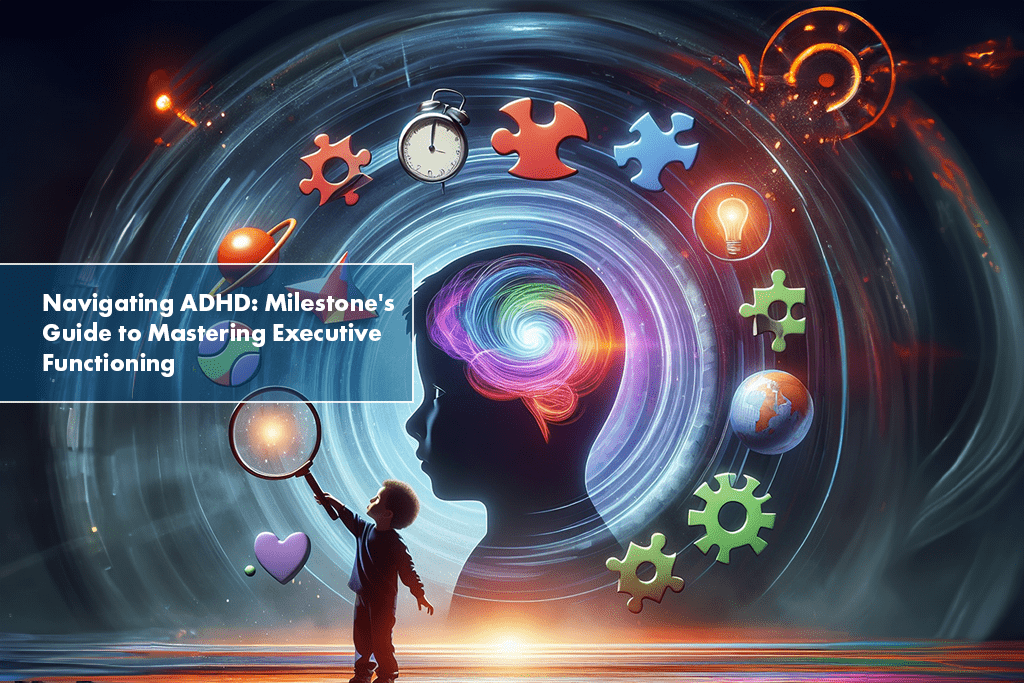Navigating ADHD: Milestone’s Guide to Mastering Executive Functioning

Many are familiar with Attention-Deficit Hyperactivity Disorder (ADHD) and its impact on individuals, especially children. However, a critical aspect that is often overlooked is how ADHD affects executive functioning. Executive functioning refers to the cognitive processes that enable people to plan, organize, make decisions, manage time, and start tasks. These skills are crucial for success in school, work, and everyday life. Yet, children with ADHD often face challenges with executive functioning, which can affect their academic performance and social interactions.
What is ADHD?
Attention-Deficit/Hyperactivity Disorder (ADHD) is a neurodevelopmental disorder that significantly impacts an individual’s ability to regulate attention, control impulsive behaviors, and often maintain an optimal level of activity. A crucial aspect of ADHD that is increasingly recognized is its effect on executive functioning. Executive functions are high-level cognitive processes that enable people to successfully plan, organize, remember instructions, and juggle multiple tasks.
These functions are essential for performing everyday tasks and achieving long-term goals. In children with Attention-Deficit/Hyperactivity Disorder (ADHD), the impact on executive functioning can be particularly pronounced and can significantly affect their daily life and development. The challenges in executive functioning associated with ADHD can manifest in various ways in children, including:
- Difficulty in Following Instructions: Children may struggle to remember and follow multi-step instructions, which can affect their ability to complete tasks at home and school.
- Problems with Organizing Tasks and Materials: They may have trouble keeping their belongings organized, planning homework assignments, or managing their time effectively.
- Impulsivity in Social Situations: The lack of inhibitory control can lead to difficulties in social interactions, such as interrupting others, not waiting for their turn, or acting without considering the consequences.
- Struggles with Transitioning Between Activities: Children with ADHD may find it hard to switch focus from one task to another, leading to resistance or frustration during transitions, such as changing from playtime to homework time.
- Homework and Academic Challenges: Due to difficulties with task initiation, sustained attention, and completion, children with ADHD may struggle with completing homework on time or performing to their academic potential.
These challenges can lead to frustration, low self-esteem, and strained relationships with peers and family members. However, with appropriate interventions and support, children with ADHD can develop strategies to improve their executive functioning skills. Occupational therapists play a crucial role in this process by:
- Assessing the child’s specific needs and challenges in executive functioning.
- Developing individualized interventions that focus on enhancing organizational skills, time management, and problem-solving abilities.
- Implementing strategies to improve focus and attention, such as breaking tasks into smaller, manageable steps or using visual aids and reminders.
- Working with parents and teachers to create supportive environments that accommodate the child’s needs, such as structured routines, clear expectations, and positive reinforcement.
- Encouraging activities that promote cognitive flexibility and inhibitory control, such as sports, martial arts, or music lessons, can also help improve self-regulation and social skills.
By addressing the executive functioning challenges faced by children with ADHD, occupational therapists can significantly contribute to their overall development and success in school and daily activities.

Five ways parents can support their children with ADHD
Here are five ways parents can support their children with ADHD with their Executive Functioning skills:
- Establish a routine: Children with ADHD thrive on routine and structure. It helps them anticipate what will happen next and reduces their anxiety. Parents can create a daily routine that includes time for homework, chores, and leisure activities. They can also use visual aids like calendars and checklists to help their children stay organized and on schedule.
- Break tasks into small steps: Children with ADHD often struggle with starting and finishing tasks. Parents can help by breaking down tasks into smaller, manageable steps. For instance, if a child needs to write an essay, parents can help them brainstorm ideas, create an outline, and write one paragraph at a time. It’s also important to celebrate each step of the way to keep the child motivated.
- Use positive reinforcement: Children with ADHD respond well to positive reinforcement. Parents can use praise, stickers, and rewards to reinforce desirable behavior, such as completing tasks on time, staying focused, and following rules. This helps build the child’s self-esteem and motivation.
- Teach time management skills: Children with ADHD often struggle with time management. Parents can teach them to use timers, alarms, and schedules to manage their time effectively. They can also help their children prioritize tasks by identifying the most important ones and tackling them first.
- Encourage physical activity: Regular physical activity can help children with ADHD improve their Executive Functioning skills. It helps them regulate their emotions, reduce impulsiveness, and increase their attention span. Parents can encourage their children to engage in physical activities like sports, yoga, and dance. Even a simple walk around the block can help them refocus and improve their mood.
At Milestone Therapeutic Services, we understand the unique challenges faced by children with ADHD and are committed to helping them overcome these obstacles. Our therapists employ various strategies explicitly tailored to improve executive functioning skills.
Moreover, our team emphasizes the importance of creating supportive environments at home and in school. Collaborating closely with parents and educators allows us to implement consistent strategies across different contexts, ensuring that children have the support they need wherever they are.
Incorporating fun and engaging activities into therapy sessions is another aspect of our approach at Milestone Therapeutic Services. By making learning enjoyable, we increase motivation and engagement among our young clients, fostering an environment where improvement in executive functioning feels rewarding rather than burdensome.
ADHD can challenge skills like time management, organization, and starting tasks. However, targeted interventions can help. At Milestone Therapeutic Services, our therapists use proven strategies to enhance these essential skills in children with ADHD, aiding their academic and social success.
